Garriott's new RPG is "the antithesis of MMOs"
Lord British looks to Kickstarter for new PC/tablet project, Shroud of the Avatar; it's a "chance to go back to his roots" he tells us
Richard Garriott, the creator of the Ultima series of RPGs, is returning to his origins with Shroud of the Avatar: Forsaken Virtues. This game is planned as the first in a series of releases that will be a blend of single-player, story-driven gaming with multiplayer elements. The target platform is the PC, with a delivery date planned for next year. Garriott discussed the details of the design and the development process with GamesIndustry International in a wide-ranging conversation.
The Kickstarter campaign for Shroud of the Avatar begins today, with the game already in development. Garriott has been working on the game for a while, but the decision to put the game project on Kickstarter wasn't made until recently. "I've been gun-shy," said Garriott. "We discussed it for a few years, but I might have opted not to do it except for watching Chris Roberts go through this whole process."
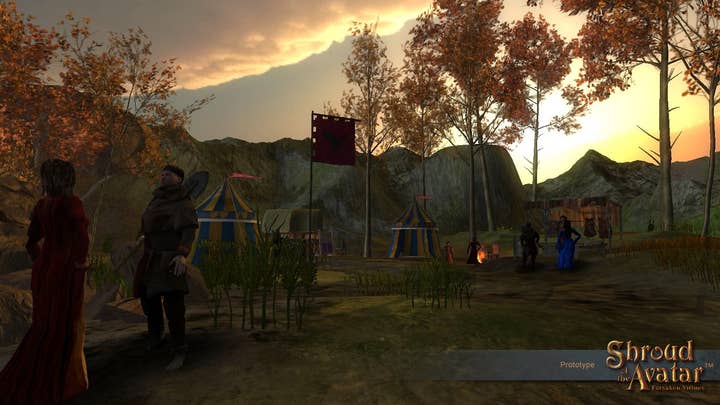
Chris Roberts' Star Citizen Kickstarter was very successful, and Roberts shared his hard-won experience with Garriott. "Now I see how it can be done well, and we've had a chance to interact with our players," said Garriott. "That made me realize that not only is there great value in running a Kickstarter from a financial viewpoint, there's great value in building that relationship with the customers early on - much more than I had imagined previously."
Doing a Kickstarter is essentially turning the classic development process on its ear. In Garriott's experience from the publishing business twenty years ago, a game would be proposed and developed by convincing a few gatekeepers within a publisher, and retail sales would be affected by how well you convinced a handful of retail buyers for major chains that the game was worthy of a strong retail push. You would never interact with customers at all until after the game shipped, and then only in a minor way. Garriott sees the customer input as extremely valuable throughout the process, and it will help him create a game that will resonate with today's audience.
"This is a chance to go back to my roots and do an Ultima-like game, as well as bring in some modern sensibilities to it"
Richard Garriott
"This is a chance to go back to my roots and do an Ultima-like game, as well as bring in some modern sensibilities to it," said Garriott. "Both in what I think is good storytelling technique that we didn't have in those days, and as well as literal technology that we have now that we didn't have back in those days. And to rectify a few of the errors that have crept into roleplaying games, or at least some of the things that are way too over-trodden in the last few years."
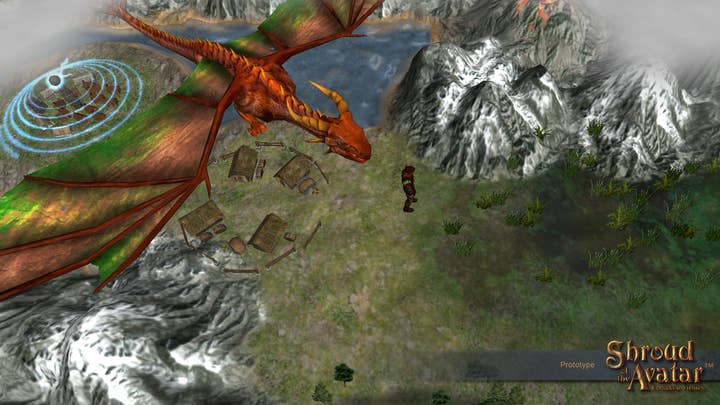
One of the most important choices Garriott has made is the decision to create a game that's neither a pure single-player experience nor a full massively multiplayer game. "The player base was saying, we really just want a solo player game. It's fine to play multiplayer, but we really were hoping you'd go build a game with a deep story in it that we couldn't get in the best of MMOs," Garriott said. "I'm itching to do that too, but their motivation is from another angle. It's good to know their angle, because that really changes some of the detail as to how I'll both pitch it and how I'll execute on some of it."
Garriott has chosen to create what he calls 'personalized multiplayer.' "Even though it's a story-driven, solo player experience - you can even play it offline if you wish - if you ever connect online there are persistent things about the world that will be uploaded to you," Garriott explained. "There are no shards of reality; there is one copy of the metagame of the story. Everyone's in the same world. If you log on just once a month, you'll have downloaded the current state of affairs of ownership and the current blueprint of people's houses. Everyone that has a shop that sells things, whatever it is that has been built up in the world you'll get to see. Your world will advance because of the contributions of other players."
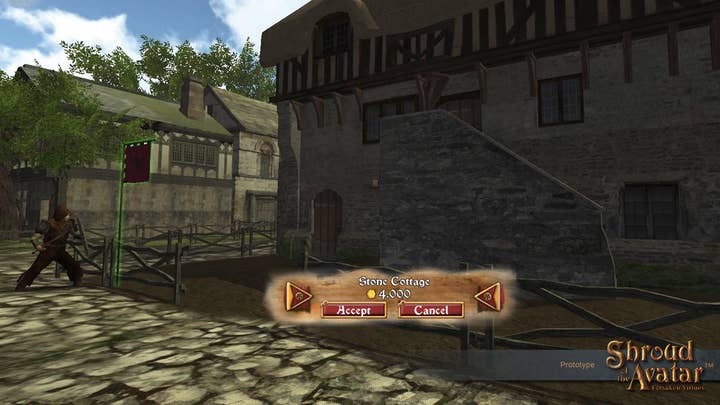
The decision to keep away from a classic MMO structure with multiple servers was made both for technical and for game design reasons. "There is no server where everyone that is connected that happens to walk onto the same map will all see each other," Garriott said. "If you do that it's terribly complicated and it's largely a waste of time for you. If you're walking on the streets of New York you don't really care about most of the people going by the other way. The only people you care about are the people you've met before or you are likely meet again in the future. We can determine that by whatever information you're willing to give us, and if you're not willing to give us information we'll use a heuristic to pull people into your current play space. It's much cheaper, for you and for us, and much more likely to be relevant to you."
The design of Shroud of the Avatar is "the antithesis of what people have been doing with MMOs these last few years," Garriott noted. "They not only build every stitch of technology from scratch, they build a giant world, and they build them all in the exact same horrifically difficult but no longer impressive model. At one time it was brilliant, but now they're all the same."
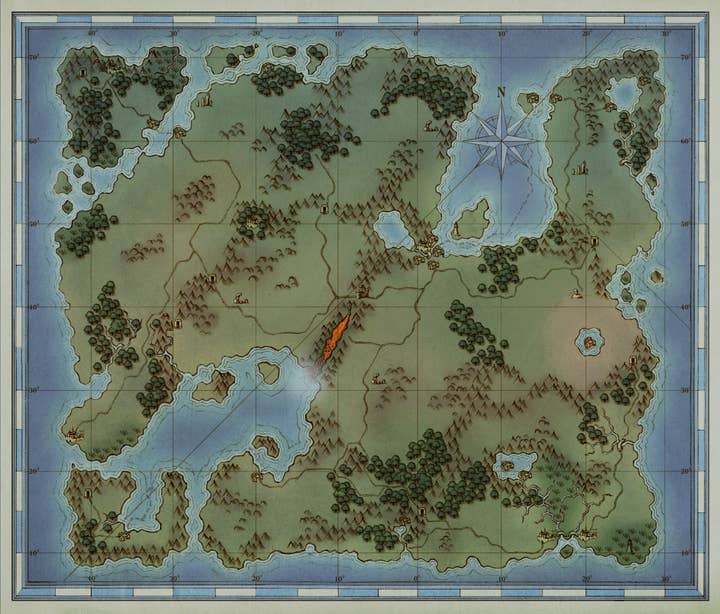
The game will have many of the classic Garriott touches, including a character system without classes, a virtue system and consequences that follow from player actions. Players will be able to create housing, and various kinds of crafting will be available. The range of activities is sufficient that some players may even enjoy the life of a homesteader, either in settled lands or on the frontier, according to Garriott. The setting is a fantasy one, but with touches of steampunk to create an intriguing blend of capabilities.
"Your world will advance because of the contributions of other players"
Richard Garriott
The map for Shroud of the Avatar was carefully crafted by Garriott to help drive the story and the character development. New installments of the game will extend the map along with the story, which meant that procedurally driven maps were out of the question. "We're going back to a two-scale world a la Ultimas through 7," Garriott explained, showing off the cloth version of the map. "There's a travel map that has points of interest on it, and those zoom into an adventure. Whenever you come to a point of interest, some might force you to go into that encounter, some of them you might elect to go into, and some might be a gateway."
Shroud of the Avatar doesn't have a custom graphics engine, and that's a great benefit in Garriott's view. "We're developing in Unity, and while there have been many great render engines, I would do an advertisement for Unity if they asked me," Garriott said. "It is phenomenal. Even though we're going to be PC first by all means, every day we not only build a PC version, but a Mac version and a Linux version and a tablet version and it will even shoehorn it onto a phone. It's shocking how useful those tools are; it's so much better than any other engine I've ever seen. It's going to save us a bunch of time."
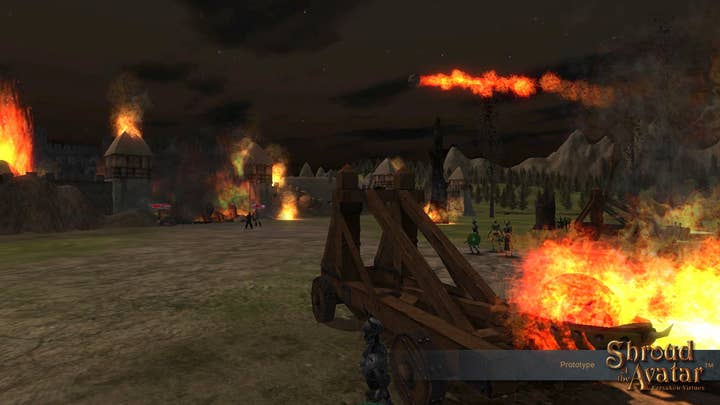
Garriott has always been a proponent of PC games, so it's not surprising that his newest game is aimed at the PC. What has changed is that he's also planning to make a version of this game for tablets. "While we know our main customer market is PC, I play mobile a lot myself, and I play on tablets a ton," Garriott noted. "I want to make sure whatever we do it would be on tablet because that way I can play it, and I want to create something I can play. That drove some of the decision-making; if you're going to play on tablets, it really also needs to be able to play offline. That was really the motivation to start the ability to play solo player and multiplayer."
The game is well underway already, and because of the design and the tool set Garriott feels he can complete the first installment sooner rather than later. "We've only been working on the game for about six months, and the team has slowly ramped up to about twelve people now," Garriott said. "I don't anticipate we're going to get to more than twenty people, and I still think we'll be able to get an alpha/beta out to the people who back us on the Kickstarter by the end of the year. We'll ship the first episode next year, probably in the spring."

